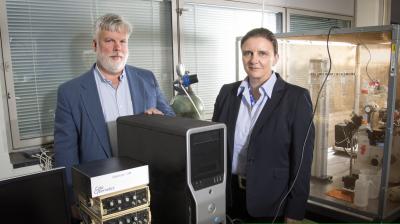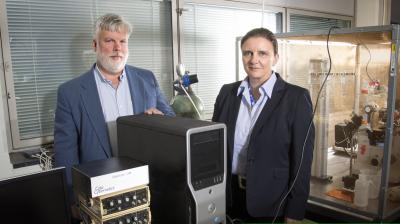
Credit: Sandra Kicman / University at Buffalo
BUFFALO, N.Y. — Cytocybernetics, a University at Buffalo spinoff, has received a $250,000 Small Business Innovation Research award from the National Institute of Mental Health (NIMH) to move into a new market: neuronal drug development.
The startup, founded by UB medical researchers, developed and sells the Cybercyte, a futuristic device that integrates electronics with individual cells to test how new medicines affect the cell's electrical activity.
So far, Cytocybernetics' focus has been on the heart: By linking the Cybercyte to heart muscle cells, scientists can test all kinds of pharmaceuticals, from allergy medications to antidepressants, for potentially fatal side effects such as heart attacks.
The new SBIR funding will enable Cytocybernetics to expand beyond cardiac applications and develop the Cybercyte for use with brain cells, called neurons.
If successful, this advancement will allow researchers to use the Cybercyte to study how drugs being developed for neurological disorders, such as epilepsy and Parkinson's disease, affect electrical activity within individual brain cells.
"This will enable neuroscientists to determine specific details of how drugs interact with neurons and affect their electrical behavior," says Cytocybernetics CEO Glenna Bett, PhD, a faculty member in the Jacobs School of Medicine and Biomedical Sciences at UB. "Whereas our work with heart cells is focused on drug safety screening, our work with neurons will target an earlier but equally important step in the drug development pipeline: studying how a drug works, and enabling scientists to more fully characterize early-stage candidate drugs with potential in neuroscience."
Bett, vice chair for research in the UB Department of Obstetrics and Gynecology, co-founded Cytocybernetics with Randall Rasmusson, PhD, professor of physiology and biophysics in the Jacobs School.
Bett says the new award from NIMH, part of the National Institutes of Health (NIH), will result in two new jobs at Cytocybernetics, adding to the firm's current total of seven full-time employees, not including Bett and Rasmusson.
"This award strengthens the notion of Western New York being an important region for early phase drug development," she says. "Dr. Mark Nowak, who joined Cytocybernetics as our lead scientist in 2015, will be overseeing our research on neuronal applications for the Cybercyte. He graduated from UB in 1992 with his PhD, went to Caltech, then worked in drug discovery in California before coming back to Buffalo to be part of the burgeoning health tech innovation culture here."
In recent years, UB and partners have worked to expand the region's entrepreneurial ecosystem, devoting new resources to promoting the growth of startups. Cytocybernetics exemplifies how these investments — ranging from increased mentoring for faculty entrepreneurs to new sources of funding for research, development and commercialization — are paying off for Western New York.
Cytocybernetics is a past $500,000 winner in the 43North startup competition, and has also received funding through the SUNY Technology Accelerator Fund (TAF). The Business and Entrepreneur Partnerships team at UB helped Cytocybernetics secure critical, early-stage R&D funding through the Center for Advanced Technology in Big Data and Health Sciences (UB CAT) and coordinated acceptance to the START-UP NY program, allowing the company to operate for 10 years without paying various state taxes.
This early support from UB, SUNY and the State of New York helped the company develop the Cybercyte, leading to a $1.5 million award Small Business Technology Transfer award from the National Heart, Lung, and Blood Institute, also part of the NIH, last year.
###
Media Contact
Charlotte eHsu
[email protected]
716-645-4655
@UBNewsSource
http://www.buffalo.edu
Original Source
http://www.buffalo.edu/news/releases/2018/10/040.html




